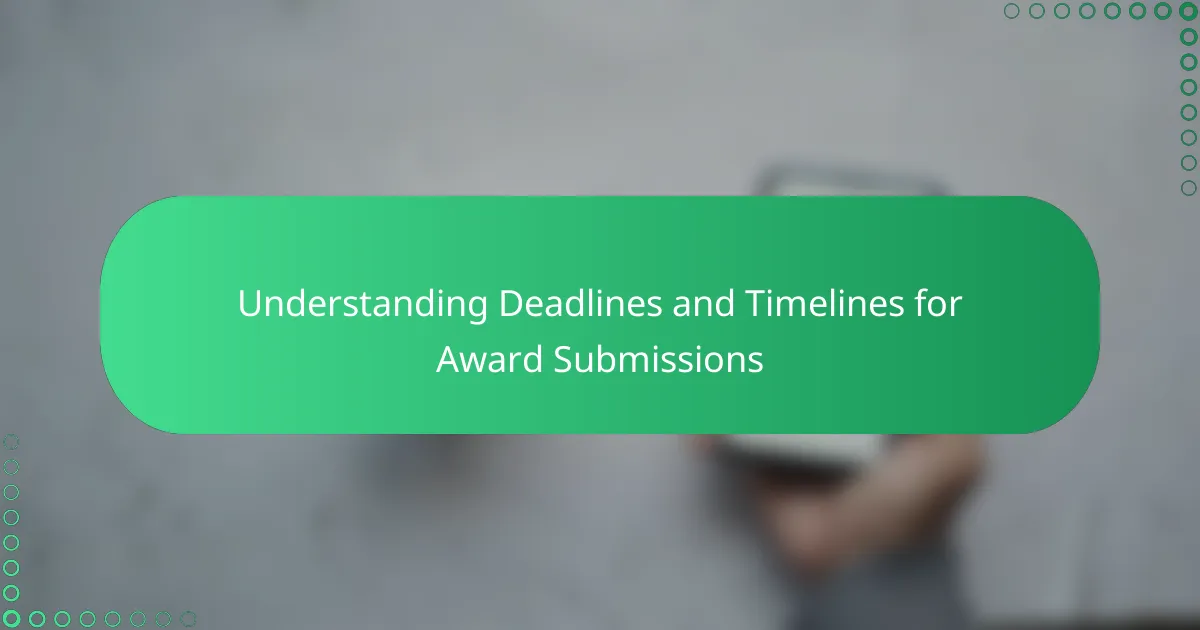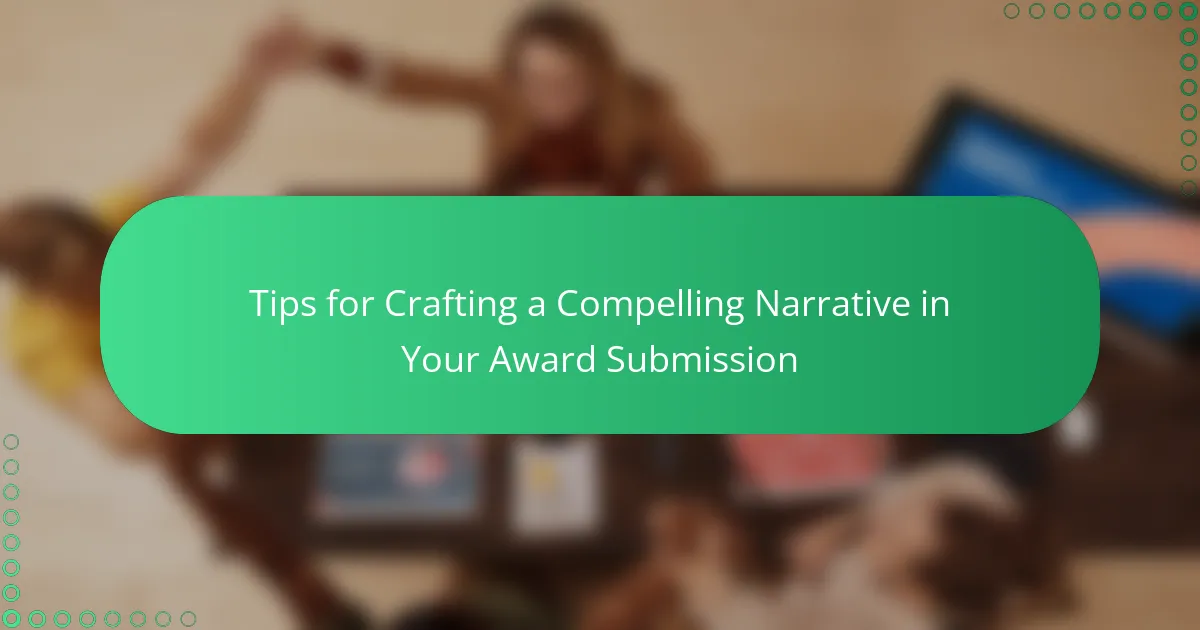Previous award winners can provide invaluable inspiration for your application by highlighting successful strategies and themes that resonate with judges. By analyzing their unique elements, measurable results, and storytelling techniques, you can identify what makes an application truly stand out in a competitive landscape. This research can guide you in crafting a compelling narrative that showcases your own achievements and strengths.

How can previous award winners inspire your application in Canada?
Previous award winners can serve as a valuable source of inspiration for your application by showcasing successful strategies and themes that resonate with judges. Analyzing their approaches can help you identify what makes an application stand out in the competitive Canadian landscape.
Identifying key themes from past winners
Start by reviewing the profiles of previous award winners to uncover recurring themes that contributed to their success. Look for common values, goals, or innovative solutions that align with the award’s criteria. For instance, if sustainability is a frequent theme, consider how your project can incorporate eco-friendly practices.
Make a list of these themes and reflect on how they relate to your own work. This can help you position your application in a way that resonates with the judging panel’s expectations.
Analyzing successful application formats
Examine the structure and format of winning applications to understand how they effectively communicate their messages. Pay attention to the clarity of their objectives, the organization of content, and the use of visuals or data to support claims. A well-structured application typically includes a clear introduction, a detailed body, and a strong conclusion.
Consider creating an outline based on these successful formats, ensuring your application is easy to navigate and highlights your key points effectively. This can significantly enhance the readability and impact of your submission.
Learning from judges’ feedback
Judges often provide feedback on applications, which can be a goldmine for understanding what works and what doesn’t. Seek out any publicly available comments or critiques from past winners’ applications to gain insights into the judges’ priorities and preferences.
Incorporate this feedback into your application by addressing common pitfalls or areas of improvement noted by judges. This proactive approach can help you avoid mistakes and strengthen your overall submission.

What are the best practices for using award-winning applications?
To effectively use previous award-winning applications as inspiration, focus on understanding their unique elements, measurable results, and storytelling techniques. Analyzing these aspects can help you craft a compelling application that stands out.
Highlighting unique project aspects
Identify what makes your project distinct compared to others. This could include innovative approaches, unique methodologies, or specific challenges you overcame. Clearly articulating these unique aspects will help your application capture attention.
For example, if your project utilized a novel technology or addressed a niche market need, emphasize these points. Use visuals or diagrams to illustrate these unique features, making them more tangible for reviewers.
Emphasizing measurable outcomes
Quantify the impact of your project by providing specific metrics. This could include percentage increases in efficiency, cost savings, or user engagement levels. Measurable outcomes lend credibility and demonstrate the effectiveness of your work.
Consider presenting your results in a clear format, such as a table or bullet points, to make them easily digestible. For instance, stating that your initiative led to a 30% reduction in costs over six months can be more persuasive than vague claims of improvement.
Incorporating storytelling techniques
Engage reviewers by weaving a narrative around your project. Start with a compelling introduction that outlines the problem you aimed to solve, followed by the journey of your project and its outcomes. A well-told story can resonate more deeply than just facts and figures.
Utilize anecdotes or testimonials to add a personal touch. For instance, sharing a brief story about a user whose life improved due to your project can create an emotional connection and enhance the overall impact of your application.

How to research previous award winners effectively?
Researching previous award winners can provide valuable insights and inspiration for your own application. Focus on understanding their achievements, strategies, and the qualities that made them stand out to the judges.
Utilizing online award databases
Online award databases are essential tools for finding past winners and their submissions. Websites like the Awards Database or specific industry-related platforms allow you to filter by category, year, and region, making it easier to identify relevant examples.
When using these databases, pay attention to the criteria that led to their success. Look for common themes in their applications, such as innovative approaches, measurable impacts, or community involvement. This can guide you in crafting your own narrative.
Networking with past winners
Connecting with previous award winners can provide firsthand insights into their application process. Attend industry events, webinars, or networking sessions where past winners may share their experiences and tips.
Consider reaching out via professional networking sites like LinkedIn. A simple message expressing your interest in their journey can lead to valuable conversations and mentorship opportunities. Many are willing to share advice on what worked for them and what pitfalls to avoid.
Reviewing case studies and testimonials
Case studies and testimonials from previous winners can offer a deeper understanding of their success stories. Look for detailed accounts that outline their challenges, strategies, and outcomes, as these narratives can reveal effective practices.
Focus on specific elements that contributed to their achievements, such as unique projects or community engagement initiatives. Analyzing these examples can help you identify key components to highlight in your own application, ensuring you present a compelling case to the judges.

What criteria should you consider when selecting inspiration?
When selecting inspiration from previous award winners, focus on their relevance to your project goals and how well they align with the expectations of your target audience. These criteria will help ensure that your application resonates effectively and stands out in a competitive field.
Relevance to your project goals
Choose previous winners whose projects closely align with your own objectives. This relevance can provide insights into successful strategies, methodologies, and outcomes that you can adapt for your application.
For example, if your project aims to promote sustainability, look for past winners who have successfully integrated eco-friendly practices. Analyzing their approaches can help you refine your own goals and enhance your proposal’s impact.
Alignment with target audience expectations
Your application should reflect the values and interests of your target audience. Review past winners to identify common themes or elements that appealed to the judges or stakeholders involved.
Consider conducting surveys or focus groups to gather feedback on what your audience finds compelling. This information can guide you in tailoring your application to meet their expectations while drawing inspiration from successful examples.

How can you differentiate your application from previous winners?
To differentiate your application from previous winners, focus on showcasing your unique strengths and perspectives. Highlight innovative solutions to common issues and articulate a distinct value proposition that sets you apart.
Innovative approaches to common challenges
Identify prevalent challenges faced by previous winners and consider how your approach can differ. For instance, if past applicants tackled sustainability, think about integrating cutting-edge technology or novel methods that haven’t been widely adopted yet.
Utilize case studies or examples from your own experience to illustrate how your innovative strategies have led to successful outcomes. This not only demonstrates your capability but also shows your proactive mindset in addressing issues.
Unique value propositions
Your unique value proposition should clearly communicate what makes your application stand out. This could be a specific skill set, a unique perspective, or a combination of experiences that others may lack. For example, if you have a diverse background in both technology and social sciences, emphasize how this blend allows you to approach problems holistically.
Consider creating a concise statement that encapsulates your unique value. This could include metrics or achievements that reinforce your claims, such as a percentage increase in efficiency from your previous projects. Tailor this proposition to resonate with the values and goals of the awarding body.

What emerging trends in award applications should you watch?
Emerging trends in award applications highlight the growing importance of sustainability, innovation, and diversity. Staying informed about these trends can enhance your application and align it with current expectations from judges and organizations.
Increased focus on sustainability
Sustainability is becoming a critical criterion in award applications, reflecting a broader societal shift towards environmental responsibility. Applicants are increasingly expected to demonstrate how their projects or initiatives contribute to sustainability goals.
To effectively incorporate sustainability into your application, consider outlining specific practices such as reducing waste, using renewable resources, or supporting local economies. For example, a project that utilizes eco-friendly materials or implements energy-efficient processes can significantly strengthen your case.
Common pitfalls include vague statements about sustainability without concrete examples. Ensure your application includes measurable impacts, such as reductions in carbon footprint or resource consumption, to make a compelling argument.



